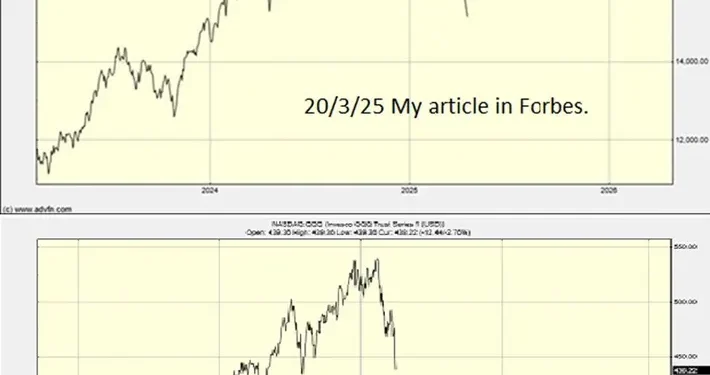Stock markets crashed on April 7, 2025, wiping out billions. Experts urge calm as investors face a global “bloodbath” in shares.
Stock Market:
Global stock markets plummeted on April 7, 2025. China’s forceful response and fresh U.S. tariffs were the primary causes of this. Investors were uneasy due to the tensions between the two strong economies.
The impact was huge:
- The S&P 500 futures dropped by 4.8%
- The Dow Jones futures went down by 4.1%
- The Nasdaq futures dropped by 5.3%
This fall affected stock markets in the U.S., India, Asia, and Europe. A live screen at the Bombay Stock Exchange (BSE) in Mumbai showed red numbers everywhere, signalling losses.
Why Did It Happen?
The main reasons behind this crash include:
- Higher tariffs imposed by the U.S
- China’s tough response
- Rising inflation
- Fears of a U.S. recession
When the U.S. government raised tariffs on Chinese goods, China responded with its measures. This created uncertainty in the global market. Investors began selling their stocks, trying to avoid further losses.
Should Investors Panic?
Market crashes happen from time to time. They are painful but also a part of investing. The key is to stay calm and take smart steps rather than making decisions out of fear.
What Experts Are Saying?
Let’s take a look at what financial experts from big firms like Morgan Stanley, Nomura, and CLSA are advising.
1. Morgan Stanley:
Morgan Stanley’s Jonathan Garner suggests a defensive approach. This implies that during lean times, investors should move their funds to more secure and low-risk industries. He asserts that the likelihood of a U.S. recession has increased. Because of inflation and the tariff situation, the U.S. central bank, the Federal Reserve, might not act quickly to boost the economy. Morgan Stanley advises investing in sectors like:
- Utilities (like power companies)
- Telecommunications (like phone and internet companies)
- Consumer Staples (like food and household products)
These sectors usually perform better during market crashes because people still use these services even during hard times.
What to avoid?
Morgan Stanley says to stay away from risky sectors like:
- Semiconductors
- Hardware
- Automobiles
- Cyclical businesses (which depend on the economic cycle)
Even though gold and defence stocks may fall for now, Morgan Stanley believes these could be good options to buy during this weakness.
2. Nomura:
Chetan Seth from Nomura says India remains a strong investment option in the Asia-Pacific region. He believes many investors will look at India as a safe place to invest their money during this dip.
Even though U.S. stocks are falling, he says their prices are still too high to invest right away. That means it’s better to wait before buying U.S. stocks again.
He also suggests avoiding stocks from Taiwan, Korea, and China, unless the U.S. changes its current policy path. In short, Nomura prefers India for now and advises a defensive approach in Asian markets outside Japan.
3. CLSA:
Laurence Balanco from CLSA says that the market has not reached its lowest point yet. He believes the current selling is still under control and not extreme.
He points out that:
- Markets are showing bearish (negative) signs
- Any short-term recovery might not last long
- More weakness could come after small rebounds.
So, CLSA’s advice is to stay cautious. Do not rush into the market just because prices are lower.
Small Investors:
If you’re a regular investor or just starting, here are some easy tips to follow during this crash:
1. Do not Panic Sell
Selling in a panic is a bad idea. When you sell at a low price, you lock in your losses. Instead, review your investments calmly.
2. Review Your Portfolio
Now is a good time to look at your investments. Do you have too much in risky sectors? If yes, consider shifting to safer areas like consumer goods or utilities.
3. Avoid Big Moves
Experts say this is not the right time for big changes. Do not invest a large sum all at once. If you want to invest, do it slowly and in small amounts (this is called SIP—Systematic Investment Plan).
4. Focus on the Long Term
The stock market has always bounced back in the past after crashes. Stay focused on your long-term goals like retirement, education, or buying a house.
5. Stay Updated But Don’t Overreact
Yes, it’s good to follow the news but don’t let headlines scare you. Look at expert advice and keep a balanced view.
Why Defensive Sectors Matter?
Let’s take a closer look at why experts suggest investing in defensive sectors:
- Utilities: People need electricity, water, and gas even during recessions.
- Telecommunications: Phones and the internet are essential for work and daily life
- Consumer Staples: People still buy soap, toothpaste, and groceries even when the economy is bad
These businesses don’t lose customers easily, so their stocks are more stable in a crash.
Gold:
Gold is known as a safe-haven asset. Even though gold prices may fall during a crash, they usually rise again when uncertainty increases. So, gold may still be a good part of your investment plan.
Final Thoughts:
The stock market meltdown of 2025 serves as a reminder of how swiftly markets may shift. When your investments decline, it’s normal to feel anxious. However, it is also the moment to be clever, not afraid.
Experts predict further difficulties. However, investors can safeguard their capital and perhaps uncover possibilities during this slump by remaining composed, exercising defensiveness, and concentrating on long-term objectives.























